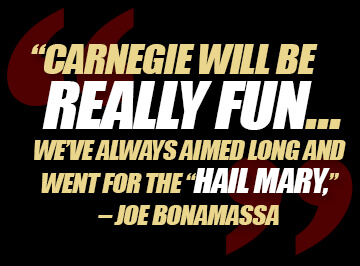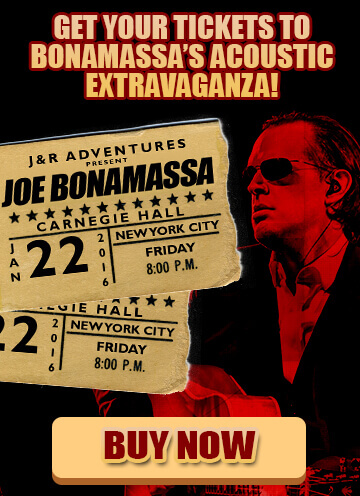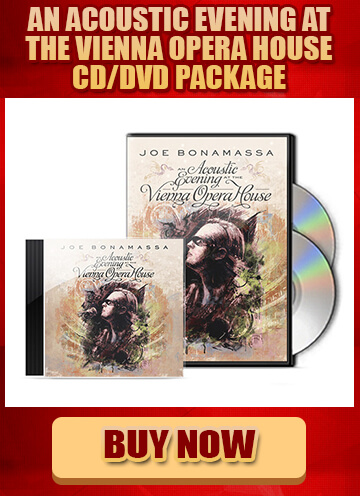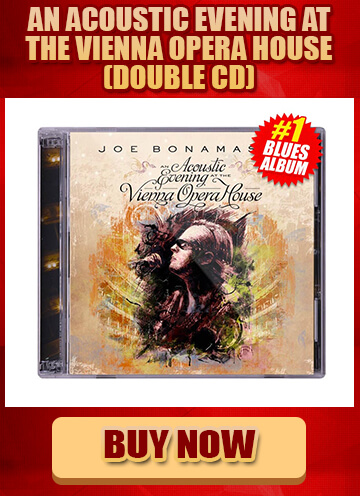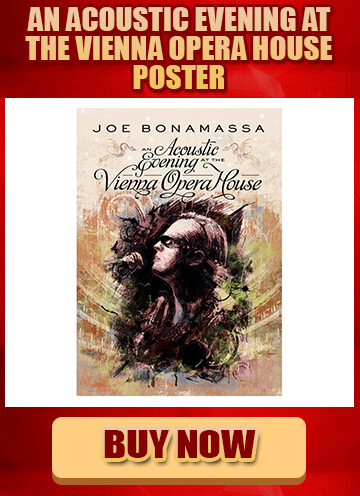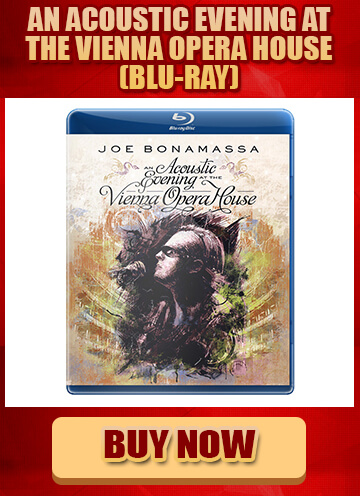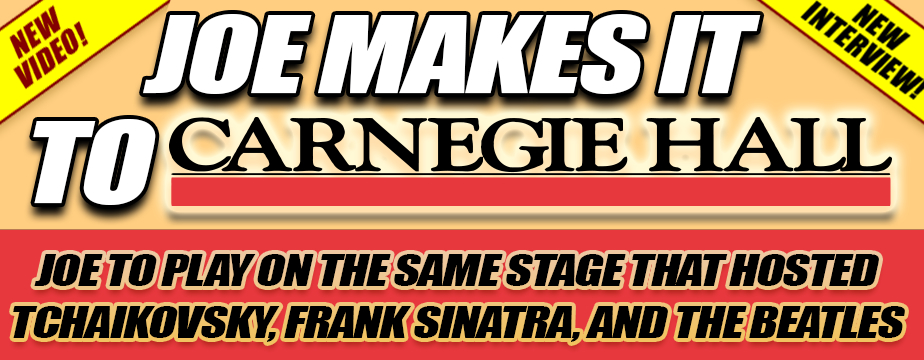

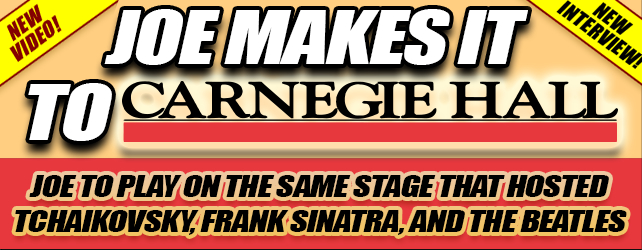

 The blues is alive and well, thanks to Joe Bonamassa. The seasoned guitarist and blues musician plays not one but two nights at the Stern Auditorium’s Perelman Stage at Carnegie Hall on January 21 and 22 for a special acoustic set with world-renowned musicians from a variety of musical backgrounds. Bonamassa hails originally from New Hartford, NY upstate and the Grammy-nominated artist makes his debut at Carnegie Hall after playing two nights last year at Radio City Music Hall. Joe Bonamassa’s show generally features a variety of musicians, with lots of horns and brass, though this special performance which will be recorded, will include a cellist and erhuist as well as a composer/percussionist. A child prodigy, Bonamassa performed at the young age of 12 opening for B.B. King in 1989 and has released 17 solo albums over the last fifteen years, including 2014’s wildly successful Different Shades of Blue, his highest-charting so far. Joe is coming off international touring as well as a summer tour in the U.S. that was called “Three Kings of Blues: Albert, B.B. and Freddie,” in tribute to the blues greats. Bonamassa spoke with New York City Monthly during his warm-up for his recent Wilmington, D.E. show, cleverly answering questions and multitasking his answers while checking chords and making sure the strings on his guitars were good to go...
The blues is alive and well, thanks to Joe Bonamassa. The seasoned guitarist and blues musician plays not one but two nights at the Stern Auditorium’s Perelman Stage at Carnegie Hall on January 21 and 22 for a special acoustic set with world-renowned musicians from a variety of musical backgrounds. Bonamassa hails originally from New Hartford, NY upstate and the Grammy-nominated artist makes his debut at Carnegie Hall after playing two nights last year at Radio City Music Hall. Joe Bonamassa’s show generally features a variety of musicians, with lots of horns and brass, though this special performance which will be recorded, will include a cellist and erhuist as well as a composer/percussionist. A child prodigy, Bonamassa performed at the young age of 12 opening for B.B. King in 1989 and has released 17 solo albums over the last fifteen years, including 2014’s wildly successful Different Shades of Blue, his highest-charting so far. Joe is coming off international touring as well as a summer tour in the U.S. that was called “Three Kings of Blues: Albert, B.B. and Freddie,” in tribute to the blues greats. Bonamassa spoke with New York City Monthly during his warm-up for his recent Wilmington, D.E. show, cleverly answering questions and multitasking his answers while checking chords and making sure the strings on his guitars were good to go...
 New York City Monthly: You have gone from playing two nights at Radio City Music Hall to two at Carnegie Hall in one year, can you believe this?
New York City Monthly: You have gone from playing two nights at Radio City Music Hall to two at Carnegie Hall in one year, can you believe this?
Joe Bonamassa: Well you know, Radio City is a bigger venue, but Carnegie is one of my bucket list gigs to do. Carnegie will be really fun – I will be very excited to play there. We’re doing it acoustically, so it’s a different gig than we normally do. I’ve been warned that electric music can sound very bad there. I’m going as an acoustic outfit, with a world-class band. Everyone’s coming from a different place. Last year we decided to do more of a horn band….I have switched gears a lot in the past 12 months. It’s about challenging the listener and yourself.
 NYCM: B.B. King who sadly passed away last this year was a mentor of yours early on, having discovered you at the age of 12. What was your relationship like over the years and how did he shape your career and your admiration for blues music?
NYCM: B.B. King who sadly passed away last this year was a mentor of yours early on, having discovered you at the age of 12. What was your relationship like over the years and how did he shape your career and your admiration for blues music?
JB: Absolutely. He was very instrumental in shaping my love of blues music and as a person. Shaping – just kind of the – you know line between the business acumen, watching out for your business, learning how to tour, making sure things are right – making the best possible show, your organization. There’s a million different things that quite frankly go into a show other than the show itself. He knew the kind of things to say to just encourage you in what you’re doing but also in giving you the keys to the car but not necessarily the car. You have to go there yourself. I would see him on occasion. The last time I saw him was about a year and a half ago at one of his gigs; he was very coherent but you could tell that it was coming to an end and he knew he needed to come off the road. Oh god, he defined the genre of music he lived in.
 NYCM: Your all-acoustic performance at Carnegie Hall on January 21 and 22 will be filmed and turned into a DVD and aired on Public Television and Palladia. Will there be any added pressure to this since it’s basically going to be available to the world? Do you anticipate any surprises happening that maybe wouldn’t occur during other live dates?
NYCM: Your all-acoustic performance at Carnegie Hall on January 21 and 22 will be filmed and turned into a DVD and aired on Public Television and Palladia. Will there be any added pressure to this since it’s basically going to be available to the world? Do you anticipate any surprises happening that maybe wouldn’t occur during other live dates?
JB: Well, as far as guests that are coming, that I haven’t even gotten my head around yet. As far as the band itself, the band is going to be a surprise, it’s a group of musicians who have never played together. As far as added pressure, I’ve made more DVDs than I care to admit, so I know how these things work. It’ll be a fun show. We’ve always aimed long and went for the “Hail Mary,” we always seem to pull it off.
 NYCM: There’s been a bit of a resurgence of blues music currently – singer Chris Stapleton, Gary Clark Jr. I liken your sound to Stevie Ray Vaughan, in terms of the passion that comes through on the guitar. But you can also sing. Was singing always a part of your act or was it something you did while songwriting and then you decided it’s not just about the guitar experience but also the entire musical experience with your voice included?
NYCM: There’s been a bit of a resurgence of blues music currently – singer Chris Stapleton, Gary Clark Jr. I liken your sound to Stevie Ray Vaughan, in terms of the passion that comes through on the guitar. But you can also sing. Was singing always a part of your act or was it something you did while songwriting and then you decided it’s not just about the guitar experience but also the entire musical experience with your voice included?
JB: I didn’t sing til I was 18. There are days I still regret singing at all – at the end of the day it’s the most inconsistent. It is predicated on your physical condition more than anything, I can carry a tune. I’m a cat that can sing, I’m a guitar player who can sing.
 NYCM: At Carnegie Hall, you will be joined by an all-star group of world-class musicians such as Chinese cellist and erhuist Tina Guo (who has done everything from classical to heavy metal) and Egyptian percussionist and composer Hossam Ramzy, who has worked on many film soundtracks and records, not to mention percussion for Jimmy Page and Robert Plant. What does it mean to you to be joining perhaps the most prestigious stage in America with folks who are at the top of their game in their own instruments?
NYCM: At Carnegie Hall, you will be joined by an all-star group of world-class musicians such as Chinese cellist and erhuist Tina Guo (who has done everything from classical to heavy metal) and Egyptian percussionist and composer Hossam Ramzy, who has worked on many film soundtracks and records, not to mention percussion for Jimmy Page and Robert Plant. What does it mean to you to be joining perhaps the most prestigious stage in America with folks who are at the top of their game in their own instruments?
JB: It worked in Vienna at the Vienna Opera House. We’re talking about people, a nyckelharpa is not exactly a blues instrument, neither is an Irish fiddle. At the end of the day it’s a universal language. Once you start amalgamating it becomes a lot of fun.
 NYCM: Keeping The Blues Alive foundation is your own non-profit started in 2011 benefitting music scholarships and music programs in public schools, reaching over 20,000 students. Being that you are a New York native, have you done any programs specifically in New York City or in NY State?
NYCM: Keeping The Blues Alive foundation is your own non-profit started in 2011 benefitting music scholarships and music programs in public schools, reaching over 20,000 students. Being that you are a New York native, have you done any programs specifically in New York City or in NY State?
JB: Well you know, we give away money every week for this thing. I’ve lost track. I can’t keep track of where it all goes. It can be any music program that needs saxophone reeds. We send money over to the UK and Germany. It’s a national operation, it’s not about seeing where, we don’t discriminate.
 NYCM: I read a little about your Guitar Safaris (he’s a huge collector of guitars) – and I heard you like to find local music stores to explore vintage instruments when you have extra time or a day off from a tour. Have you had this kind of time in the past in NYC and if so do you have any interesting stories associated with one of your guitar safaris?
NYCM: I read a little about your Guitar Safaris (he’s a huge collector of guitars) – and I heard you like to find local music stores to explore vintage instruments when you have extra time or a day off from a tour. Have you had this kind of time in the past in NYC and if so do you have any interesting stories associated with one of your guitar safaris?
JB: New York City is not a great place for that. Peoria, IL is a great place for that. Rudy’s on 48th Street used to be a great place for that. There were 5 or 6 shops. Now there’s a Soho shop, but it’s a lot of Driftwoods. Rudy’s got a lot of nice stuff, but with a Guitar Safari, you want to trip and fall over stuff. You want to see something that hasn’t been passed around to a dealer or search around on eBay. I have enough f * * king guitars, at the end of the day, you want a guitar with a cool story.
 NYCM: Why should someone who has never seen or heard of Joe Bonamassa come to your show in January?
NYCM: Why should someone who has never seen or heard of Joe Bonamassa come to your show in January?
JB: At the end of the day – I guess what it is, I don’t know why they come. I think there’s a catalog of songs that people go back and forth and people enjoy those songs and the new songs I make. It’s a little bit different, it’s not the same. It’s not a high production value, there’s no track. It’s walking the high wire without the net.
 NYCM: Lastly, do you think blues music is only for a high-brow audience or could it break more mainstream again like Eric Clapton, as an example?
NYCM: Lastly, do you think blues music is only for a high-brow audience or could it break more mainstream again like Eric Clapton, as an example?
JB: I don’t think it’s high-brow – mainstream is what it is. Eric Clapton had both pop hits and always was footing the blues. He’s the high-water mark, one of my absolute guitar heroes and musical guide. The Black Keys and Jack White, they dress up the blues for college kids in a way that they aren’t listening to the blues. I like it. I think it’s fantastic, I think it’s pretty extraordinary. They’re the only people that are taking it to the mainstream. The Black Keys record is a blues record, and it was basically a modernized version of Electric Mud, kind of a psychedelic record, like Howlin’ Wolf and Muddy Waters.
(Photo Credit: Christie Goodwin)
